2014 年上海外国语大学 MTI 翻译硕士真题
2014年考研上海对外经贸大学翻译硕士真题(回忆版)
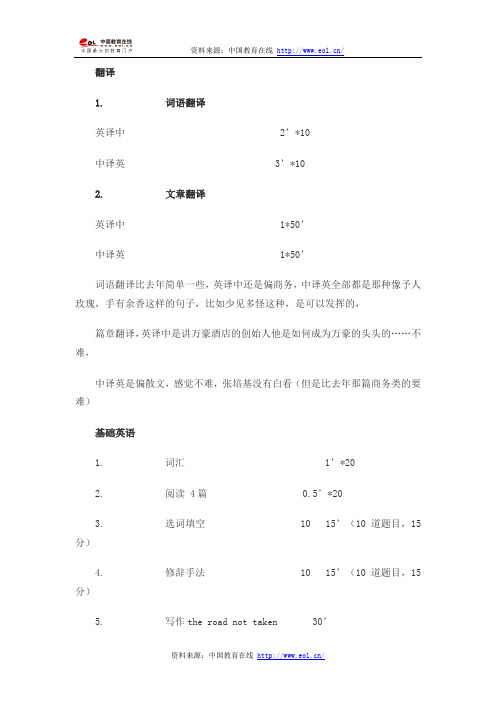
翻译
1. 词语翻译
英译中 2’*10
中译英 3’*10
2. 文章翻译
英译中 1*50’
中译英 1*50’
词语翻译比去年简单一些,英译中还是偏商务,中译英全部都是那种像予人玫瑰,手有余香这样的句子,比如少见多怪这种,是可以发挥的,
篇章翻译,英译中是讲万豪酒店的创始人他是如何成为万豪的头头的……不难,
中译英是偏散文,感觉不难,张培基没有白看(但是比去年那篇商务类的要难)
基础英语
1. 词汇 1’*20
2. 阅读 4篇 0.5’*20
3. 选词填空 10 15’(10道题目,15分)
4. 修辞手法 10 15’(10道题目,15分)
5. 写作the road not taken 30’
词汇比去年难,专八的,语法题没了,改错题没了
阅读还可以,不是很难
选词填空的词汇比较难,恋母情结什么的……
修辞手法有十个,PUN之类的,蛮难的,都忘记了
写作还好,400字,题目自拟
百科
1. 填空 1’*10
2. 名词解释 2’ *20
3. 应用文给党中央写个信,说说怎么增强文化软实力 1*40’(去年也是给党中央写信……)
4. 大作文我看人生(要结合时事) 1* 60’
百科我只能说永远是我的痛……去年考了很多经济贸易政治的,我今年狂复习啊,结果今年考了暴多历史的,什么第一部字典,第一部印刷品,望闻问切的切,利玛窦也有,但是我没想起来,还是什么忘记了,反正就是很惨不忍睹,
大作文和应用文还好吧……主要是要字迹清晰。
上海外国语大学mti英语翻译硕士考研真题
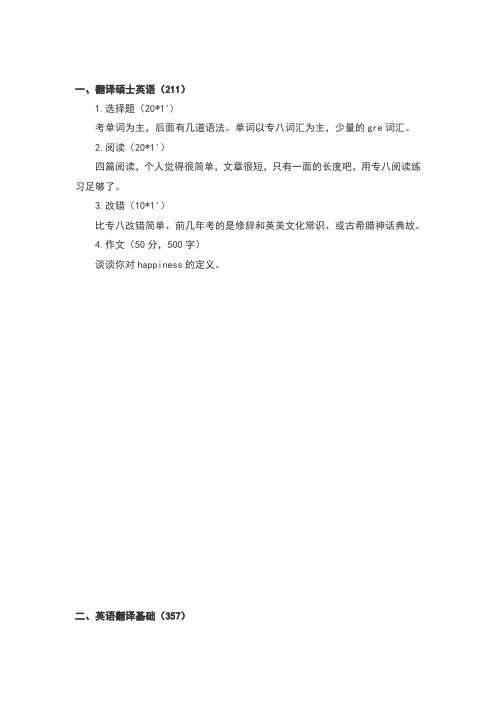
一、翻译硕士英语(211)1.选择题(20*1')考单词为主,后面有几道语法。
单词以专八词汇为主,少量的gre词汇。
2.阅读(20*1')四篇阅读,个人觉得很简单,文章很短,只有一面的长度吧,用专八阅读练习足够了。
3.改错(10*1')比专八改错简单、前几年考的是修辞和英美文化常识、或古希腊神话典故。
4.作文(50分,500字)谈谈你对happiness的定义。
二、英语翻译基础(357)1.英译汉(75分)该部分选取的是卢梭的《爱弥儿》(Emile, or On Education)部分文章,主要选自《爱弥儿》第三卷第一节。
全文1000多字,共11段,但题目只要求翻译划线部分,总计翻译872字,共6段。
完整原文如下:The whole course of man's life up to adolescence is a period of weakness; yet there comes a time during these early years when the child's strength overtakes the demands upon it, when the growing creature, though absolutely weak, is relatively strong. His needs are not fully developed and his present strength is more than enough for them. He would be a very feeble man, but he is a strong child.What is the cause of man's weakness? It is to be found in the disproportion between his strength and his desires. It is our passions that make us weak, for our natural strength is not enough for their satisfaction. To limit our desires comes to the same thing, therefore, as to increase our strength. When we can do more than we want, we have strength enough and to spare, we are really strong. This is the third stage of childhood, the stage with which I am about to deal. I still speak of childhood for want of a better word; for our scholar is approaching adolescence, though he has not yet reached the age of puberty.About twelve or thirteen the child's strength increases far more rapidly than his needs. The strongest and fiercest of the passions is still unknown, his physical development is still imperfect and seems to await the call of the will. He is scarcely aware of extremes of heat and cold and braves them with impunity. He needs no coat, his blood is warm; no spices, hunger is his sauce, no food comes amiss at this age; if he is sleepy he stretches himself on the ground and goes to sleep; he finds all he needs within his reach; he is not tormented by any imaginary wants; he cares nothing what others think; his desires are not beyond his grasp; not only is he self-sufficing, but for the first and last time in his life he has more strength than he needs.I know beforehand what you will say. You will not assert that the child has more needs than I attribute to him, but you will deny his strength. You forget that I am speaking of my own pupil, not of those puppets who walk with difficulty from one room to another, who toil indoors and carry bundles of paper. Manly strength, you say, appears only with manhood; the vital spirits, distilled in their proper vessels and spreading through the whole body, can alone make the muscles firm, sensitive, tense, and springy, can alone cause real strength. This is the philosophy of the study;I appeal to that of experience. In the country districts, I see big lads hoeing, digging, guiding the plough, filling the wine-cask, driving the cart, like their fathers; you would take them for grown men if their voices did not betray them. Even in our towns, iron-workers', tool makers', and blacksmiths' lads are almost as strong as their masters and would be scarcely less skilful had their training begun earlier. If there is a difference, and I do not deny that there is, it is, I repeat, much less than the difference between the stormy passions of the man and the few wants of the child. Moreover, it is not merely a question of bodily strength, but more especially of strength of mind, which reinforces and directs the bodily strength.This interval in which the strength of the individual is in excess of his wants is, as I have said, relatively though not absolutely the time of greatest strength. It is the most precious time in his life; it comes but once; it is very short, all too short, as you will see when you consider the importance of using it aright.He has, therefore, a surplus of strength and capacity which he will never have again. What use shall he make of it? He will strive to use it in tasks which will help at need. He will, so to speak, cast his present surplus into the storehouse of the future; the vigorous child will make provision for the feeble man; but he will not store his goods where thieves may break in, nor in barns which are not his own. To store them aright, they must be in the hands and the head, they must be stored within himself. This is the time for work, instruction, and inquiry. And note that this is no arbitrary choice of mine, it is the way of nature herself.Human intelligence is finite, and not only can no man know everything, he cannot even acquire all the scanty knowledge of others. Since the contrary of every false proposition is a truth, there are as many truths as falsehoods. We must, therefore, choose what to teach as well as when to teach it. Some of the information within our reach is false, some is useless, some merely serves to puff up its possessor. The small store which really contributes to our welfare alone deserves the study of a wise man, and therefore of a child whom one would have wise. He must know not merely what is, but what is useful.From this small stock we must also deduct those truths which require a full grown mind for their understanding, those which suppose a knowledge of man's relations to his fellow-men--a knowledge which no child can acquire; these things, although in themselves true, lead an inexperienced mind into mistakes with regard to other matters.We are now confined to a circle, small indeed compared with the whole of human thought, but this circle is still a vast sphere when measured by the child's mind. Dark places of the human understanding, what rash hand shall dare to raise your veil? What pitfalls does our so-called science prepare for the miserable child. Would you guide him along this dangerous path and draw the veil from the face of nature? Stay your hand. First make sure that neither he nor you will become dizzy. Beware of the specious charms of error and the intoxicating fumes of pride. Keep this truth ever before you--Ignorance never did any one any harm, error alone is fatal, and we do not lose our way through ignorance but through self-confidence.His progress in geometry may serve as a test and a true measure of the growth of his intelligence, but as soon as he can distinguish between what is useful and what is useless, much skill and discretion are required to lead him towards theoretical studies. For example, would you have him find a mean proportional between two lines, contrive that he should require to find a square equal to a given rectangle; if two mean proportionals are required, you must first contrive to interest him in the doubling of the cube. See how we are gradually approaching the moral ideas which distinguish between good and evil. Hitherto we have known no law but necessity, now we are considering what is useful; we shall soon come to what is fitting and right.Man's diverse powers are stirred by the same instinct. The bodily activity, which seeks an outlet for its energies, is succeeded by the mental activity which seeks for knowledge. Children are first restless, then curious; and this curiosity, rightly directed, is the means of development for the age with which we are dealing. Always distinguish between natural and acquired tendencies. There is a zeal for learning which has no other foundation than a wish to appear learned, and there is another which springs from man's natural curiosity about all things far or near which may affect himself. The innate desire for comfort and the impossibility of its complete satisfaction impel him to the endless search for fresh means of contributing to its satisfaction. This is the first principle of curiosity;a principle natural to the human heart, though its growth is proportional to the development of our feeling and knowledge. If a man of science were left on a desert island with his books and instruments and knowing that he must spend the rest of his life there, he would scarcely trouble himself about the solar system, the laws of attraction, or the differential calculus. He might never even open a book again; but he would never rest till he had explored the furthest corner of his island, however large it might be. Let us therefore omit from our early studies such knowledge as has no natural attraction for us, and confine ourselves to such things as instinct impels us to study.2.汉译英(75分)2016年11月5日,上海外国语大学首届“中国学的国际对话:方法与体系”国际研讨会在虹口校区高翻学院同传室拉开帷幕,本次学术研讨会由上外主办,中国学研究所协同国际关系与公共事务学院、高级翻译学院联合承办,欧盟研究中心、俄罗斯研究中心、英国研究中心、中日韩合作研究中心以及马克思主义学院共同参与。
高译教育-上海外国语大学考研英语翻译基础真题样题2014
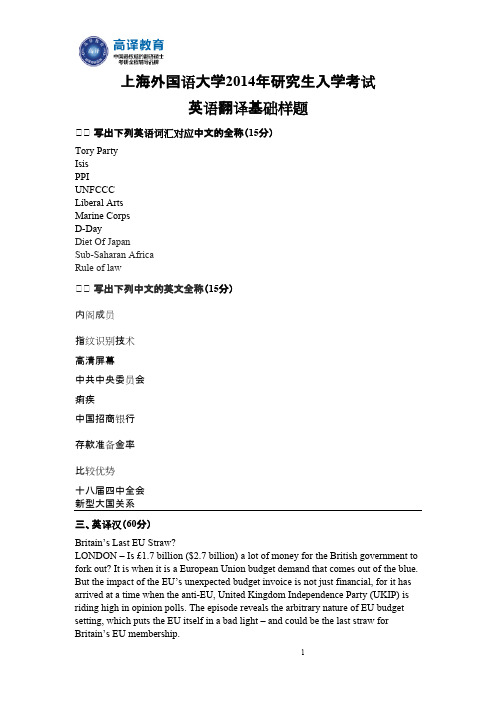
上海外国语大学2014年研究生入学考试英语翻译基础样题、、写出下列英语词汇对应中文的全称(15分)Tory PartyIsisPPIUNFCCCLiberal ArtsMarine CorpsD-DayDiet Of JapanSub-Saharan AfricaRule of law、、写出下列中文的英文全称(15分)内阁成员指纹识别技术高清屏幕中共中央委员会痢疾中国招商银行存款准备金率比较优势十八届四中全会新型大国关系三、英译汉(60分)Britain’s Last EU Straw?LONDON – Is £1.7 billion ($2.7 billion) a lot of money for the British government to fork out? It is when it is a European Union budget demand that comes out of the blue. But the impact of the EU’s unexpected budget invoice is not just financial, for it has arrived at a time when the anti-EU, United Kingdom Independence Party (UKIP) is riding high in opinion polls. The episode reveals the arbitrary nature of EU budget setting, which puts the EU itself in a bad light – and could be the last straw for Britain’s EU membership.The bill originates from a statistical recalculation by Eurostat, the EU statistical office, of the UK’s economic performance over the past 20 years. The longer-terms costs, however, could be much greater than the relatively small amount (0.1% of GDP) involved. The political crisis – which originated with the calculation of national budget surcharges and rebates from the EU budget – stems from an institutional arbitrariness that seems unjust and fosters immense resentment. Like friendships or marriages that break down over seemingly trivial issues that in fact signify fundamental problems, this budget crisis has highlighted a serious flaw in the UK-EU relationship.The new financial demand surprised UK Prime Minister David Cameron, who called it “completely unacceptable.” For many Euroskeptics, this was yet another sign of a conspiracy by the European Commission against Britain. Referring to a children’s murder-detective board game, Cameron declared: “You don’t need a Cluedo set to know that someone has been clubbed with the lead piping in the library.” A better comparison might have been with the “Chance” cards in Monopoly, the Great Depression-era board game that highlighted the random injustice of capitalism.The timing of the spat could not be better for Britain’s EU opponents. UKIP could conceivably hold the balance of power following next May’s general election, and force the government to hold its promised “in-out” referendum on EU membership. Under electoral pressure, Britain’s two main parties – Conservatives and Labour – are already advocating limits on immigration that are incompatible with EU law and the core principles of European integration. The emotional escalation may lead many people, on both sides of the English Channel, to conclude that the UK and the EU would each be better off without the other.Pre-existing tensions have inevitably played a large part in the current flare-up. But is the EU’s budget calculation method also at fault?It is rational for a country’s EU budget contribution to reflect its real level of economic activity. In any case, the total EU budget, at around 1% of EU output, is relatively small, and has not changed for more than 30 years. The recalculation simply attempts to achieve a more accurate picture of the EU economy, correcting for activity not officially measured in national accounts, such as charity, drugs, and prostitution. Moreover, Britain was not the only EU member to fall foul of the recalculation. Italy’s economic performance also looked better than previously assumed, necessitating an additional payment. Italian Prime Minister Matteo Renzi duly joined the chorus of outrage, calling the recalculation a “lethal weapon.”To be sure, it is fundamentally sensible for governments to monitor and tax as much domestic economic activity as possible. An external assessment that attempts to account for the whole of the economy – and calculates the budget contribution on this basis – should increase tax efficiency. Poor taxation capacity has, after all, been an endemic problem in southern Europe, including in Italy (and especially in Greece), while France and Germany, which both received large rebates, are better tax collectors.Italy, like Greece, has been trying to broaden its tax base. Aerial surveys now detect garden swimming pools; tax assessors investigate yachts moored in harbors; and no transactions above €1,000 ($1,268) may be made in cash.Yet why should the EU’s budget calculations place such importance on national accounts, which constitute a set of arbitrary conventions? If, for example, wages were paid for housework, GDP would increase without any more activity taking place. In a rational world, EU budget contributions would not be arbitrarily set, but would be automatically determined, say, as a fixed proportion of value-added tax (VAT) receipts. Only a relatively small share would be needed, requiring no periodic recalculations.Assessing, and then reassessing, members’ dues in the current way damages the EU. Taken to its logical extreme, member countries would demand recalculations to reflect the different ways they measure income and wealth, thereby pitting potential beneficiary countries against contributors. Such a fiscal set-up has already threatened to break up member states – consider Scotland or Catalonia.If the EU is seen as being little more than a treasure chest that allots fiscal resources to its members, it is bound to fail. As geopolitical challenges mount, and Europe faces its first systemic security threat since the end of the Cold War, the stakes could not be higher. Europe cannot get bogged down in what should be a simple bureaucratic process. Rather, the EU must be able to explain what it truly represents, and these ideals must be reflected in actions that are clear, predictable, and non-arbitrary.、、汉译英(60分)朱镕基谈中国加入WTO中国和美国最近达成的关于中国进入WTO的双边协议。
高译教育-上海外国语大学考研翻译硕士英语真题样题2014
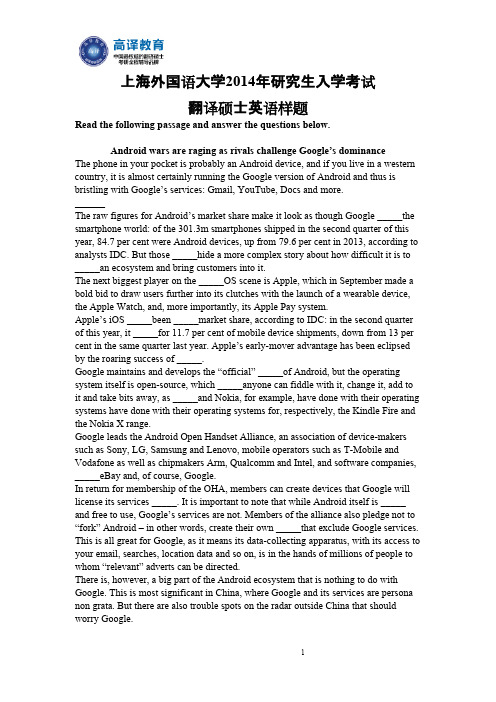
上海外国语大学2014年研究生入学考试翻译硕士英语样题Read the following passage and answer the questions below.Android wars are raging as rivals challenge Google’s dominanceThe phone in your pocket is probably an Android device, and if you live in a western country, it is almost certainly running the Google version of Android and thus is bristling with Google’s services: Gmail, YouTube, Docs and more.______The raw figures for Android’s market share make it look as though Google _____the smartphone world: of the 301.3m smartphones shipped in the second quarter of this year, 84.7 per cent were Android devices, up from 79.6 per cent in 2013, according to analysts IDC. But those _____hide a more complex story about how difficult it is to _____an ecosystem and bring customers into it.The next biggest player on the _____OS scene is Apple, which in September made a bold bid to draw users further into its clutches with the launch of a wearable device, the Apple Watch, and, more importantly, its Apple Pay system.Apple’s iOS _____been _____market share, according to IDC: in the second quarter of this year, it _____for 11.7 per cent of mobile device shipments, down from 13 per cent in the same quarter last year. Apple’s early-mover advantage has been eclipsed by the roaring success of _____.Google maintains and develops the “official” _____of Android, but the operating system itself is open-source, which _____anyone can fiddle with it, change it, add to it and take bits away, as _____and Nokia, for example, have done with their operating systems have done with their operating systems for, respectively, the Kindle Fire and the Nokia X range.Google leads the Android Open Handset Alliance, an association of device-makers such as Sony, LG, Samsung and Lenovo, mobile operators such as T-Mobile and Vodafone as well as chipmakers Arm, Qualcomm and Intel, and software companies, _____eBay and, of course, Google.In return for membership of the OHA, members can create devices that Google will license its services _____. It is important to note that while Android itself is _____ and free to use, Google’s services are not. Members of the alliance also pledge not to “fork” Android – in other words, create their own _____that exclude Google services. This is all great for Google, as it means its data-collecting apparatus, with its access to your email, searches, location data and so on, is in the hands of millions of people to whom “relevant” adverts can be directed.There is, however, a big part of the Android ecosystem that is nothing to do with Google. This is most significant in China, where Google and its services are persona non grata. But there are also trouble spots on the radar outside China that should worry Google.Google’s biggest concern is Samsung. The search giant’s relations with the South Korean smartphone maker have been strained, as Samsung has fired warning shots that indicate it probably doesn’t need Google as much as Google needs Samsung, which is by far the biggest vendor of Android OHA devices.Samsung has been tinkering with an alternative operating system, Tizen, and includes its own mail and other services alongside Google’s on its Galaxy Android devices. In theory, Samsung could drop Google’s version of Android and focus on developing Tizen further or move to the non-Google version of Android.That version is the Android Open Source Project – the one developers work with when they don’t want to join forces with Google. AOSP is free and is the version that Amazon has used in its Fire devices. Nokia used AOSP to create the well-received Nokia X range before Microsoft assimilated Nokia’s devices division and killed the project.Amazon and Nokia would do well to look to China, where local providers have built strong ecosystems on the AOSP version of Android. In hardware, Xiaomi has 31.6 per cent of the urban Chinese market, according to Carolina Milanesi, chief of research at Kantar Worldpanel, the market research company. “Xiaomi is the model that works,” she says.What works in China is a package of services delivered via the hardware. At the end of last year, Gartner, the research company, noted: “Chinese-based internet providers, such as Baidu, Alibaba Group and Tencent, [are] providing local featured apps, services and content through app stores that they themselves operate. This participation is preventing Google from being a major beneficiary of smartphone user growth in the China market.”If Google has lost out in China, it could lose out elsewhere. Microsoft is keen to get its services – , Bing, Office and OneDrive – into more hands, and while its Windows Phone OS has been well received, its market share of just 2.5 per cent in the second quarter of this year means it has a long way to go.Intriguingly, Microsoft chief executive Satya Nadella has been reported as talking to Cyanogen, which maintains a popular AOSP fork of Android. While Microsoft is unlikely to be considering buying Cyanogen, partnering with it to provide services as part of the package makes sense.Here’s a blue-sky suggestion for Mr Nadella: sit down with Jeff Bezos at Amazon to develop a good fork of Android. Microsoft has a compelling services offering but an almost non-existent platform for these services, despite the quality of the Lumia handsets. Amazon has compelling content with its Prime video but seems unable to get consumers to buy its Fire devices.For smaller providers, a Microsoft-Amazon-style joint venture would be a great way to become part of an ecosystem out of Google’s reach. I suspect consumers would find that attractive. How about it, Satya and Jeff?1 Filling the blanks with a word.(15’)2 Reading Comprehension (40’)1) How does Google, in corporation with other firms, manage to direct relevent ads to potential customers?2) According to Milanesi Carolina, what is the model that is effective in China?3) Why does the author say probably Samsumg does not need Google as much as Google needs Samsung?4) On what basis does the author suggest the CEOs of MS and Amazon to coorporate with each other?3 Composition of no less than 700 words. (45’)Some people say modern people are becoming slaves of smartphones rather than using them as traditional tools to make our lives convenient. What`s your opinion on this and what would you suggest to smartphone users so that they could be less constrained by these handsets?参考答案1.dominates2.figures3.build4.mobile5.has6.losing7.accounted8.Android9.version10.means11.Amazon12.including13.to14.open-source15.versions16.Member companies of the OHA can create devices that Google will lisence itsservice to, while they promise not to create versions that exclude Google services.Consequently, Google will be able to collect customer datas with mobile devices made by various manufacturers, and then send the relevant adverts to the targeted customers.17.This model includes a package of services delivered via the hardware. Forexample, they would provide local featured apps, services and content through app stores that they themselves operate.18.Samsumg is by far the biggest vendor of Android OHA devices, while Samsungis building its own operating system, Tizen, and it could well drop Google’sversion of Android and focus on developing Tizen further or move to the non-Google version of Android. We could say Google need to depend on Samsumg`shardware for promoting its operating system, while in the future, Samsumgprobably does not need Google as much for its operating system.19.MS has compelling services like , Bing, Office and OneDrive but itlacks a well-built platform. On the other hand, Amazon has its great content with its Prime video yet lacks other supporting services to attract enough customers.Given these facts, MS and Amazon could complement eache other throughcooporation.作文参考:I love smartphones. I've always loved cell phones to begin with, but I am still very much amazed at how much phones have progressed. From flip phones to these giant hunks of hardware that can do more than I could have ever imagined a phone doing, smartphones are certainly something to marvel. Smartphones can certainly make our lives easier for us as we use them for everyday tasks such as checking the calendar, as alarm clocks, as a calculator, as a phonebook and more. But as smartphones keep progressing with new ways to make our lives easier, are they hindering our natural need for social interactions?I realize lately that there are less and less things that I actually, physically have to go out and do now-a-days than when I did when I was younger. Meaning, there were certain things that I would go and do that I don't necessarily have to do anymore. Although I also see this as a convenience, because most of these interactions wouldn't be deemed acceptable to do in my pajamas and my hair looking like a hot mess otherwise, there's still the question that I have to ask that makes me wonder if I'm missing out on something. Like, that I'm missing out on something that, as a human, I might need to be doing.When I first started working for PhoneDog, I wrote an article that questioned whether we had become addicted to our phones. Without really needing to delve too deep into the article, it's pretty clear that at least I was addicted. I had a bad habit of caring less about the conversation happening in front of me rather than one that was constantly ongoing in my pocket. I lived for the buzz of a text message, and had a bad habit of needing to check it as soon as I possibly could. I have since re-assessed just how important text messages are and realized that there is a reason they were sent in text form, and that's so I could respond to them at my earliest convenience. That doesn't necessarily mean they should be checked right away. If something that was said in a text message was that important, they probably should have made a phone call.But it's not just text messages that are possibly crippling certain social aspects of our lives. There is so much more that we can do with our phones now than just communicate with our friends, family and colleagues. Things that we normally would get up and leave our house for is no longer a necessity. And yes, it is a convenience, but at the same time it makes me question just how far smartphones andcorresponding applications will take it before we hardly ever have a real reason to leave the house anymore.For example, back when I was younger and a new movie came out, my dad or brother would take me up to the local Blockbuster or some other video joint to rent one. But with apps like Netflix, Hulu+, Amazon Prime Instant Video and other similar applications, these video stores are no longer necessary. Not only is it more convenient to instantly stream a video anytime you want to from just about any device with a screen, but it's also so much cheaper. Also, you don't have to silently curse the kid that took the last copy of that movie that you initially came in to rent. Digital streaming means there's enough copies for everybody!And what about banking? You hardly ever have a reason to go to the bank now. We can do transfers and check deposits straight from our phones as well. You can order a pizza from just about any pizza joint through an app on your phone. You can shop from almost any store over the Internet that you have access to right on your phone. You can get FedEx to pick up and ship a package for you. You can just do so many things from your smartphone now!But it's convenient, that's for sure. While I do question what this is doing to our social practices, I also realize that it's my choice to continue to use these services because they're just more convenient. It's just that when you take the time to see how far we have come, where we are right now, and also where this could be heading, it's a little strange to realize just how antisocial society is becoming. At least, that's where we seem to be headed.。
2014年上海大学翻硕真题
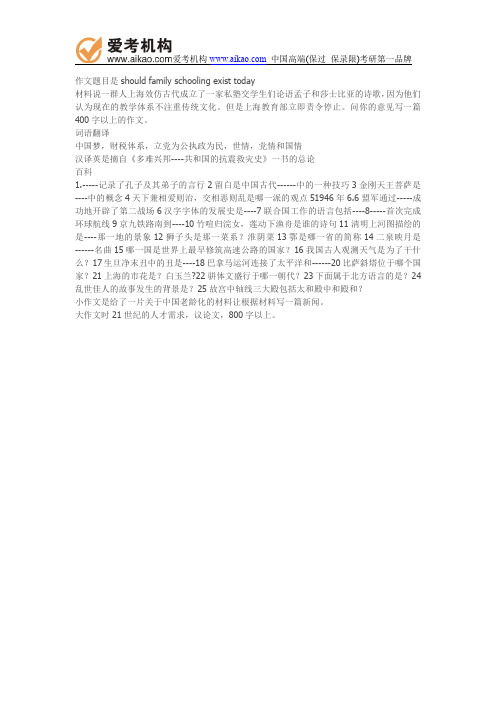
爱考机构中国高端(保过保录限)考研第一品牌
作文题目是should family schooling exist today
材料说一群人上海效仿古代成立了一家私塾交学生们论语孟子和莎士比亚的诗歌,因为他们认为现在的教学体系不注重传统文化。
但是上海教育部立即责令停止。
问你的意见写一篇400字以上的作文。
词语翻译
中国梦,财税体系,立党为公执政为民,世情,党情和国情
汉译英是摘自《多难兴邦----共和国的抗震救灾史》一书的总论
百科
1.-----记录了孔子及其弟子的言行2留白是中国古代------中的一种技巧3金刚天王菩萨是----中的概念4天下兼相爱则治,交相恶则乱是哪一派的观点51946年6.6盟军通过-----成功地开辟了第二战场6汉字字体的发展史是----7联合国工作的语言包括----8-----首次完成环球航线9京九铁路南到----10竹喧归浣女,莲动下渔舟是谁的诗句11清明上河图描绘的是----那一地的景象12狮子头是那一菜系?淮阴菜13鄂是哪一省的简称14二泉映月是------名曲15哪一国是世界上最早修筑高速公路的国家?16我国古人观测天气是为了干什么?17生旦净末丑中的丑是----18巴拿马运河连接了太平洋和------20比萨斜塔位于哪个国家?21上海的市花是?白玉兰?22骈体文盛行于哪一朝代?23下面属于北方语言的是?24乱世佳人的故事发生的背景是?25故宫中轴线三大殿包括太和殿中和殿和?
小作文是给了一片关于中国老龄化的材料让根据材料写一篇新闻。
大作文时21世纪的人才需求,议论文,800字以上。
育明考研:上外翻译硕士参考书真题
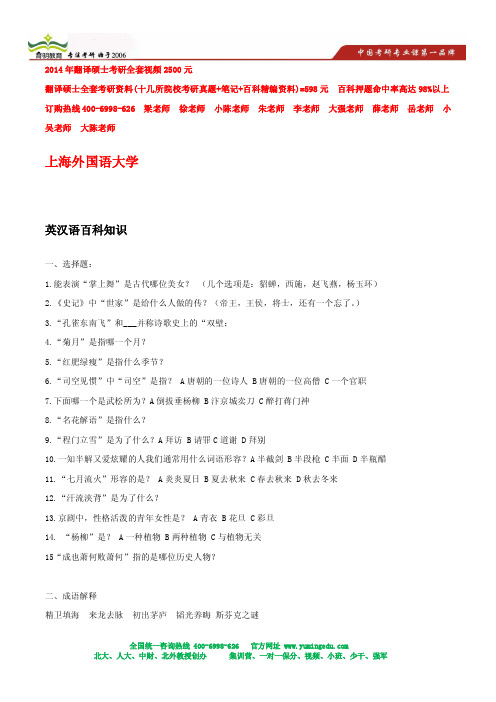
全国统一咨询热线 400-6998-626 官方网址
北大、人大、中财、北外教授创办 集训营、一对一保分、视频、小班、少干、强军 2014年翻译硕士考研全套视频2500元
翻译硕士全套考研资料(十几所院校考研真题+笔记+百科精编资料)=598元 百科押题命中率高达98%以上 订购热线400-6998-626 梁老师 徐老师 小陈老师 朱老师 李老师 大强老师 薛老师 岳老师 小吴老师 大陈老师
上海外国语大学
英汉语百科知识
一、选择题:
1.能表演“掌上舞”是古代哪位美女? (几个选项是:貂蝉,西施,赵飞燕,杨玉环)
2.《史记》中“世家”是给什么人做的传?(帝王,王侯,将士,还有一个忘了。
)
3.“孔雀东南飞”和___并称诗歌史上的“双壁:
4.“菊月”是指哪一个月?
5.“红肥绿瘦”是指什么季节?
6.“司空见惯”中“司空”是指? A 唐朝的一位诗人 B 唐朝的一位高僧 C 一个官职
7.下面哪一个是武松所为?A 倒拔垂杨柳 B 汴京城卖刀 C 醉打蒋门神
8.“名花解语”是指什么?
9.“程门立雪”是为了什么?A 拜访 B 请罪C 道谢 D 拜别
10.一知半解又爱炫耀的人我们通常用什么词语形容?A 半截剑 B 半段枪 C 半面 D 半瓶醋
11.“七月流火”形容的是? A 炎炎夏日 B 夏去秋来 C 春去秋来 D 秋去冬来
12.“汗流浃背”是为了什么?
13.京剧中,性格活泼的青年女性是? A 青衣 B 花旦 C 彩旦
14. “杨柳”是? A 一种植物 B 两种植物 C 与植物无关
15“成也萧何败萧何”指的是哪位历史人物?
二、成语解释
精卫填海 来龙去脉 初出茅庐 韬光养晦 斯芬克之谜。
2014年上海外国语大学考研翻译硕士MTI复试经验分享
2014年上海外国语大学考研翻译硕士MTI初试经验分享1、政治(1月4号上午)这个没什么说的,背吧。
不过理解了再背容易很多,文科生的话基本高中学过,大致套路应该是清楚的,只是有些地方更深入吧。
马原、毛概、近代史,这些都还好,最烦的是思修,真的空话套话一大堆,各种某某的内涵某某的落脚点等等等等,极其雷同,这个只有背了。
我个人没有报班的,用的肖秀荣,感觉还不错吧,至少双色印刷重点比较突出。
反正就是那个系列的书,跟着发布时间来就是了。
我是9月中下旬的时候开始背的政治,记性不好啊,只有多看几遍了。
反正最后77分。
2、翻译硕士英语基础(1月4号下午)题型:无选项完型填空+阅读(问答题形式)+作文(500字左右)。
考试时间还是很够的。
这个真的不是应试了,市面上这方面的资料很少的,无选项完型填空我还是后来才听说CATTI 2、3上面有,我做的时候,正确率超低啊唉~~~20%——80%之间徘徊,一般是40%左右,不过这个参考性也不大,考试的时候谁知道会是什么材料呢,只能说做做题找找感觉。
阅读同理,这个我真的是没做题。
作文同理,我作文其实练得不多的,大四上学期可能一共练了有五六篇吧,惭愧惭愧。
各位学弟学妹有时间的时候多练练作文也无妨,最好有人帮你改下,没人的话自己写了,放一段时间,回过头去看,也能发现问题的。
【总之这一科就是英语基本功,靠你多年来学英语的知识积累了,临时抱佛脚的话,反正我是推荐不了什么资料】3、英汉互译(1月5号上午)题型:词语翻译、篇章翻译,就这两种,都是有英译汉、汉译英。
严重强调,注意把握时间。
词语翻译的话,以前是光翻译就可以了,英译汉里面包含缩略语翻译的,所以我辛辛苦苦背了N多缩写词,结果今年呢,没考缩略语翻译;多了一点就是除了翻译之外要解释,英语短语用汉语解释,汉语短语用英语解释。
例:Linsanity 答:林来疯。
最早是《华盛顿邮报》给NBA球员林书豪取的外号,现在已经成为林书豪个人的代名词。
2014年翻译硕士考研英语真题汇总
2014年翻译硕士考研英语真题汇总第一部分短语翻译英译汉部分(1*15=15’)CA TTI GRE GDPplay of wordsKumara Jivasemantic translationcultural untranslatabilitydescriptive translation studiesidiomatic expressions in Englishideological conflictinterpreter's boothnegative transfer of cultureover-loaded translationRobinson CrusoeGone with the Wind汉译英部分(1*15=15’)兵马俑高等专业人才高等师范教育研究生资格考试形似端午节忠、顺信达雅文化偏见黑话形式与内容的统一英汉翻译内在规律《英译汉入门须知》《词义剖析与词典编纂》官方语言第二部分文章翻译英译汉(60’)A reader in Florida, apparently bruised by some personalexperience, writes in to complain, “If I steal a nickel's worth of merchandise,I am a thief and punished; but if I steal the love of another'swife, I amfree.”This is a prevalent misconception in many people'sminds---that love, like merchandise, can be “stolen”。
Numerous states, in fact,have enacted laws allowing damages for “alienation of affections”。
上海外国语大学考研翻译学2014年真题回忆版分享
上海外国语大学考研翻译学2014年真题回忆版分享第一部分#翻译理论#一、写出下列英文术语的中文意思,并用中文简要解释。
semantic translationconsecutive interpretingtranslation normssense for sense translationreader-oriented translation二、写出下列中文术语的英文翻译,并用英文作简要解释。
译者的操纵脱离语言结构交际翻译实证研究计算机辅助翻译三、论述题,用中文作答。
大意如下:(记得不是很清楚了,大家稍微看看吧)有人主张忠实的翻译应该以直译为主,也有人主张忠实的翻译应该以意译为主。
请你谈谈:这两种翻译策略分别“忠实的部分”是什么?另外,这两种翻译策略适用于哪些类型的文本的翻译?四、论述题,用中文作答。
大意如下:请你简要论述术语库(数据库)的建设对于翻译实践的功能和指导作用?语料库的建设对于翻译理论的研究具有的功能和指导作用?五、论述题,用英文作答。
Do you agree that extrovert people make better interpreters? Why?第二部分 #翻译实践#今年没有考完型,英翻中是全文要翻,后面的中翻英段落也挺多的,整个卷子的翻译量还是很大的。
一、Translate the following passage into Chinese.网址如下:(上外出的题目果然出乎意料,选了japantoday上面的文章。
)/category/opinions/view/making-sen se-of-chinas-meager-typhoon-aidMaking sense of China's meager typhoon aidIan BremmerFaced with a devastating typhoon a mere 700 miles away, Chinese President Xi Jinping this week pledged financial support for the Philippines, as did nearly every other industrialized nation. Australia offered $30 million; the Europeans $11 million; the United Arab Emirates promised $10 million. China offered $100,000.The media backlash was immediate. Within days, an embarrassed Beijing upped its pledge to $1.6 million. That‟s still less than a sixth of the total offered by Japan, China‟s main regional rival. In 2010, China overtook Japan as the second-biggest economy in the world.Faced with a devastating typhoon a mere 700 miles away, Chinese President Xi Jinping this week pledged financial support for the Philippines, as did nearly every other industrialized nation. Australia offered $30 million; the Europeans $11 million; the United Arab Emirates promised $10 million. China offered $100,000.What gives - or doesn‟t give, as the case may be? Why is an economy so big, a government so willing to invest abroad, and a country so eager to win favor in the region stiffing a neighbor in need? Because China is still a new enough power that it has no tradition of shelling out helpings of foreign aid - and because the Philippines is not China‟s favorite country at the moment.And despite its successes, China is actually still a poor country. Its per capita income finally topped $9,000 last year, which ranks China about 90th in the world, depending on the exact measure. Nearly 130 million of its people live on less than $1.80 per day. With a renewed sense of urgency to tackle the country‟s many economic reform c hallenges, China has far too many pressing needs at home to be cutting big checks abroad.At least, that‟s what its less-advantaged populations might well think. In 2008, nearly 70,000 people died in China when an earthquake struck outside the central Chinese city of Chengdu. And this year, nearly 200 died when a quake rattled the country‟s southwest. This is a country that struggles with its own domestic disaster relief.Let‟s remember, too, that the Philippines is a former American colony. There are already hundreds of U.S. troops on the ground helping with the relief effort. There is also the small matter of the South China Sea, which the Chinese, as documented in the New York Times Magazine a few weeks ago, want for themselves. For China, offering huge sums of money to a foreign community - especially one with which China has a beef over maritime borders - is a nonstarter.It‟s easy to think that the typhoon relief effort is an opportunity to break that impasse. But just because that‟s how the U.S. uses f oreign aid - as a tool with which to change public opinion abroad - doesn‟t mean China thinks the same way. It has virtually no infrastructure to push aid abroad - there‟s no equivalent of USAID or American nonprofits like Habitat for Humanity. The mandate of China‟s diplomatic corps is largely determined by the work its state-owned companies do abroad. China courts favor by investing, not giving.A rising China will lead to a radically different international response to crises over time. China says it wants a de-Americanized world, and the U.S. has lately stepped back from its traditionally activist foreign policy. But where will the world turn for disaster relief when a still-poor China has become the world‟s largest economy?After the shooting in Newtown, Connecticut a year ago, a quote from legendary TV kidsshow host Mr. Rogers went viral:“When I was a boy and I would see scary things in the news, my mother would say to me, …Look for the helpers. You will always find people who are helping.‟ To this day, especially in times of …disaster,‟ I remember my mother‟s words, and I am always comforted by realizing that there are still so many helpers - so many caring people in this world.”What happens when the largest economy is a country that doesn‟t want to do the things we expect the largest economy to do?That‟s a problem that extends well beyond typhoons, earthquakes and aid.二、中译英,将划线段落翻译成英文。
上海外国语大学考研汉语国际教育2014年真题分享
上海外国语大学考研汉语国际教育2014年真题回忆版分享第一部分:汉国教基础I、填空1 四渎中的东渎北渎2 韩赵魏分晋历史进入战国时代封建制度基本确立3 金文又叫大篆的代表4 魏晋玄学清代朴学5 禅宗初祖菩提达摩慧能6 制度史“三通”7 第一部诗歌总集8 西班牙首都9 古希腊三大悲剧10 莎士比亚四大悲剧11 五音II、判断1 九州说法始于《尚书禹贡》2 唐以后是五胡十六国3 三大崇拜4 《永乐大典》是元代5 鉴真东渡三次才成功6 “三苏”是父子7 《窦娥冤》是王实甫作的8 《徐霞客游记》是明代的9 《玉茗堂四梦》是孔尚任作的III、选择1 彩陶文化是指2 文景之治是汉代3 两大显学是儒学和墨学4 朱熹的学说是闽学5 朱熹主持的书院6 莲宗又叫7 《抱朴子》作者8 《资治通鉴》体例9 女真族建立金国10 司马相如的赋奠定汉赋体例11 秦汉到隋郡县制12 《四库全书》保存最完整文津阁13 “上下”的造字方法14 新乐府运动唐代IV、简答1 西方哲人说印刷术、火药、指南针这三样东西改变了世界,为什么?(9分)2 针灸是什么?其目的和理论依据。
(9分)第二部分:教育学I、填空、选择1图式2认知法的语言学基础3语言综合运用能力、文化、策略和什么4教学内容5汉语教师应拥有听说读写和的能力6 对外汉语教学相关四学科7 语法教学的内容8汉字大纲包括几级9 功能法又叫10 消极强化11正迁移II、判断1建构2发现法优于传授法,所以教学中要用发现法3行为主义既包括行为的变化,也包括知识的变化4教学中应以教师为中心5声母按发音方法分为双唇音、唇齿音等6“张江男”“白富美”等是错误的用法7汉语基本语序SVO,但也有SOV、OVSIII、材料分析受国家委派去美国任教,却遇到教材不匹配,课时进度学习时间安排与自己打算有出入等问题。
被安排在小学,学生都不同肤色,有不同习惯和禁忌。
明天就要开学,应该怎么办。
第三部分:汉语基础I、填空1 语言物质外壳语法结构规律2 韵母个数3 声调由音高决定重音和轻声由音强决定4 “你去哪儿买咖啡豆”有几个语素5 字体有哪几种6 和普通话差异最大的是闽粤第二是7 韵母分为哪三部分8 “四定”是指(←连续考三年啦= =)9 从语素所处的位置可以分为10 词的分类的三种标准哪三种最重要的哪一种11 四种句类II、判断1 调值由调类决定2 哪种方言作为基础方言是有使用人口决定的3 语素以单音节为主4 古代词以单音节为主,现代双音节5 《汉语拼音方案》包括的部分6 h和g主要是发音体不同7 “揭露”和“米粒”都是补充式8 “来着”是助词9名词不能作谓语10 “啊”“呀、嘛”表示的是不同语气11 独立成分只能用在开头或末尾12 “她歌唱得很好听”是动补谓语句13 “我校为汉硕开设了《汉语语言学》、《对外汉语教学》等课程。
- 1、下载文档前请自行甄别文档内容的完整性,平台不提供额外的编辑、内容补充、找答案等附加服务。
- 2、"仅部分预览"的文档,不可在线预览部分如存在完整性等问题,可反馈申请退款(可完整预览的文档不适用该条件!)。
- 3、如文档侵犯您的权益,请联系客服反馈,我们会尽快为您处理(人工客服工作时间:9:00-18:30)。
2014年上海外国语大学MTI翻译硕士真题
翻译硕士英语2014
一、(30分)关于汽车行业的发展史及现状前景(cloze)——长度:A4纸一页多一点。
20个空(无选项,凭语感填词)
二、(30分)根据以上阅读,回答一下5个问题。
(可以在文章找到答案,或者需要总结答案)
三、(40分)写一篇400字的英语作文:就china auto industry development 向Chinese government给出建议(advice)。
英语翻译基础2014
一、用汉语解释下列词语(15分)
1.Shanghai Free Trade Zone
2.European parliament
3.Climate change
4.Stakeholder
5.Linsanity
二、用英语解释下列词语(15分)
1.莫言
2.中国梦
3.负面清单
4.尽职调查
5.量化宽松
(以上两道题共十个词,请注意,不仅仅是翻译,还要继续解释词语)
三、英译汉(一篇英语文章60分)
文章题目是:Work With China,Don’t Contain It(自己上网搜原文吧,外国人写的)(contain:遏制,牵制)全文翻译——长度:A4纸一页
四、汉译英(段落翻译60分)
文章题目是:第三届上海外国语大学与联合国签署高校合作协议大会开幕致辞
翻译的那部分涉及上海外国语大学的简介,与国际组织的合作(很多国际翻译机构名称要翻译),以及祝福。
汉语写作与百科知识2014
一、填空题(9道小题,30分)
1.古代科举前三名分别叫状元、、探花。
2.六朝古都分别是南京、西安、北京、杭州、开封、。
3.京剧按传统,五角色分别是生、旦、。
4.花甲是岁,古稀岁,耄耋岁。
5.鲁迅说《》是史家之绝唱,无韵之离骚。
6.儒家继孔子后,是一大圣人;道家继老子后,是主要人物。
7.小说在唐朝被称作。
8.新文化运动运动德先生和赛先生分别指。
9.联合国五个常任理事国是。
二、成语解释,给出词义,典故出处,并造句。
(5个小题,40分)
1.完璧归赵
2.汗牛充栋
3.卧薪尝胆
4.防微杜渐
5.防人之口,甚于防川
(以上解释请看清题目要求,颇多)
三、根据以下3000字的议论文写一篇读后感(1000字)(80分)
文章题目是:鲁迅的文章刺痛了谁的神经
作者:北极
这是关于新语文教材,逐出鲁迅文章的一幅漫画。
看罢,有人欢喜有人恼。
有的人乐得手舞足蹈;也有的人会愤慨和忧虑。
画里的那个包袱,让人看了很是不爽。
不知作者在里面放的是什么?是银元还是卢布,可以肯定不会是美元,也不是人民币。
因为鲁迅从来就没有讨好美国主子的习惯,不会拿了外国人的钱,来替主子坑害同胞,便得不了美元;不会推荐老子给了红包的儿子,去名牌大学、不会为既做婊子又立牌坊的人去捉刀,给他们歌功颂德,也就得不了人民币。
请记住,鲁迅是惯于在围剿中战斗的,不屈也不倒的战士,绝不是这个雪夜上梁山的林教头的形象。
教材改革不应该是有所非议的,时代在发展,文章也应该有删和增。
然而偏偏对鲁迅的文章开刀,用“金庸武侠小说《雪山飞狐》替掉《阿Q正传》”,把《药》、《阿Q正传》、《记念刘和珍君》踢出,一个主编表示,新语文课本对名家作品的增减主要考虑其是否适合现在中学生,考虑语文性。
鲁迅先生的一些作品对于现在的中学生来说,可能太深了,他们读起来不容易懂。
也顺便把《病梅馆记》,《五人墓碑记》、《狼牙山五壮士》等等都踢出了,增加了一些时髦的文章,还有鲁迅那个时代的一些平淡文章,因有的作者是汉奸,编者美其名曰:论文章的精美不论作者的人品,增加了古文的篇幅,用一位语文老师的话说,有很多篇幅过长,内容晦涩难懂的古文,不知道编者的用意何在,不知道该让学生学习什么;增加了武侠小说,说是改革的开始,以后还得增加,为了适应学生;增加了《新鲜的网络语言》,来“媚学生。
即使是小孩子也能看出他们言行自相矛盾,难道那些晦涩难懂的古文就比鲁迅的文章容易懂吗?同是鲁迅的文章,换上的就比踢出的易懂吗?
搞教育的主编不去做调查研究,就用可能太深了,他们读起来不容易懂这样主观臆断的话来搪塞吗?与秦桧的莫须有,有何不同?
武侠小说可以宽容,胡言乱语的新人类的网络语言可以宽容......这个也能宽容,那个也能宽容,为什么鲁迅的这几篇影响几代人,深受欢迎的著名文章就不能宽容呢?
透过这些胡言乱语和杂乱无章的行为,可以看出,踢出去的都是针砭时弊或是有战斗性的文章,总之是让人看了有思想,不安心做顺民,更不用说做奴才的
文章。
换上的文章无论内容好坏,水平高下,都是平和的文章。
这就使人明白一个道理,为什么拿鲁迅的文章开刀,驱逐了鲁迅的文章,那些沐猴而冠者,弹冠相庆,心花怒放。
因为鲁迅的文章刺痛了某些人的神经,让他们如芒在背,如坐针毡,有批判和战斗的文章都让他们不舒服。
此前,就有人反对鲁迅的文章,说在课本里太多,还对孩子影响不好,不文明,不利于和谐;也反对朱自清的文章,说《背影》的感情是假的,作者的父亲翻越站台,就是不遵守交通规则,也是不应该给孩子看的。
透过这些荒唐可笑的谎言,可以看出他们的真正嘴脸。
历史的发展总的是前进的,有时候是循环往复的,一些残渣余孽还会重新泛滥,还会披着新生事物的外衣,借尸还魂。
那些鲁迅笔下一些人物又在这个时代出现了,看了鲁迅的文章,他们自己和别人都会对号入座,怎么不让他们心惊肉跳,坐卧不安?
他们惧怕的是鲁迅那可以刺透画皮和伪装,直达骨髓,痛及神经的
‘金不换’。
鲁迅的文章像一面照妖镜,毫不留情的照出了各色大小妖魔的嘴脸,所以就拼命反对。
学了鲁迅的文章,会有敏锐的目光、会有骨气、会有正义感。
见了欺负女孩子的邓贵大、活埋了不愿搬迁的老太太、为了讨回被乡里克扣的煤矿赔款,被送进精神病院的孔孟故里的老汉......就不会缄默,也要发出几声呐喊,这样怎么不让他们诚惶诚恐呢?
朱自清虽然没有鲁迅这样的投枪和匕首,但也是饿死不吃美援面粉的有骨气的文人,他的骨气和《背影》里的真挚感情,让那些口中恋着雨中巷子走出的,结着丁香般愁结的姑娘,身子却躺在“天上人间”销魂的正人君子们汗颜,羞愧和气恼。
于是他们驱除了阿Q、刘和珍、狼牙山五壮士;砸了五人墓碑,踢了病梅馆、挡住了背影......这些人都是暴徒,好事者,发牢骚的人......怎么能容呢?
孩子们可以去看武侠小说,去雨中忧伤,去晦涩难懂的古文中学国学,去《弟子规》里学规矩,最好去故纸堆里,学八股文,或者像那位被鲁迅痛骂,而如今奉为大师的人,说的那样:只知道干活赚钱吃饭。
不怕不做良民,就怕不做
顺民,爱管闲事。
万万不能学鲁迅,他可是连欧美的友邦人士和党国政府都抨击的人,不能读他战斗的檄文,那样不就学成不敬官僚、富豪、权威,而为草民贱民呐喊的可恶之人了吗!
鲁迅毕竟是世界级的大师,世界十大文豪里唯一的一个中国人,深受中国人民以及世界人民的敬仰和爱戴,不敢一棒子打死,便有了,编教材的专家说的,用不著名的《铸剑》等文章,替来换,必修的放到选修。
鲁迅的投枪和匕首是为了国家和民族而投的,不是为了自己的个人恩怨和利益,单是这一点就让人感动和敬仰,也对比出那些为了自己的私欲而反对他的人的渺小和卑劣。
鲁迅是中国文化革命的主将,他不但是伟大的文学家,而且是伟大的思想家和伟大的革命家。
鲁迅的骨头是最硬的,他没有丝毫的奴颜和媚骨,这是殖民地半殖民地人民最可宝贵的性格。
鲁迅是在文化战线上,代表全民族的大多数,向着敌人冲锋陷阵的最正确、最勇敢、最坚决、最忠实、最热忱的空前的民族英雄。
鲁迅的方向,就是中华民族新文化的方向。
鲁迅虽然不在了,但是他的精神还在,文章依然有现实意义、依然有战斗力、依然刺激人的神经。
鲁迅刺激了谁的神经?刺激了那些资本家的乏走狗,落水狗,哈巴狗,聪明人、奴才、赵二爷、假洋鬼子、张嘴欧美教育闭口国学的高尔础、满嘴仁义道德,肚里男盗女娼,心里要吃人的伪君子.....,刺激了那些能自己对号入座的人。
无论几只苍蝇怎么叫,蚍蜉是撼不动大树的,永远也憾不动的!。
